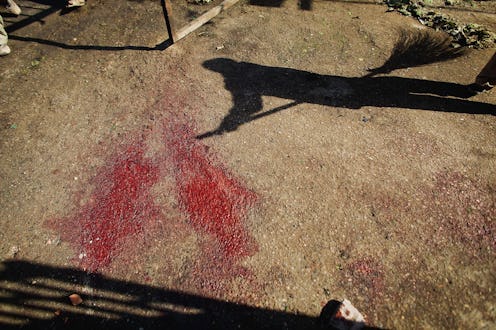News
Third Pakistan Bombing This Week Kills 37 People
Having survived not one but two explosions over the last week (not to mention the earthquake that literally shook the country on Tuesday), the northwestern city of Peshawar, Pakistan, is now facing its third tragedy, after a car bomb blew up on a crowded street Sunday, killing 37 and injuring dozens of others.
The car, carrying 440 pounds of explosives, was parked in the city's Qissa Khawani bazaar — the city's most ancient market-place, and one of its largest. It was detonated via remote control, destroying at least ten shops, several cars, and creating a five-feet deep crater. The explosion left 37 dead and 75 injured, many critically.
Only two days ago, 19 people died after a bus carrying government workers exploded in the city's outskirts.
The Pakistani Taliban immediately distanced itself from Sunday's attack, saying: "We are targeting the government machinery and the law enforcement agencies but not general public."
It had also previously denied involvement with last week's suicide explosions at a church in Peshawar, which left 85 dead and Pakistan's Christian minority enraged. Two other militant groups, splinter groups of the Taliban, claimed responsibility for the church attack, calling it retaliation for U.S. drone strikes in Pakistan's northwestern region.
Although it remains unclear who carried out Sunday's car bombing, only a few hours before the explosion occured, a U.S. drone strike killed 4 suspected Pakistani militants — raising suspicions that the sam splinter groups might be to blame.
Shortly after the attack Sunday, Prime Minister Nawaz Sharif condemned the assailants, saying that the bombing was organized by people who are “devoid of humanity and all religions,” but adding that “barbaric acts” would “not deter the government’s resolve to ensure peace in the country.”
Earlier this week at the U.N. General Assembly, Sharif had urged the U.S. government to put an end to its drone strikes in the region.
“The use of armed drones in the border areas of Pakistan is a continued violation of our territorial integrity,” Sharif said. “It results in casualties of innocent civilians and is detrimental to our resolve and efforts to eliminate extremism and terrorism from Pakistan.”
According to a study by the Bureau of Investigative Journalism, at least 474 civilian deaths were caused by CIA drones in Pakistan between 2004 and 2012. But terrorist activity in the region has also been getting worse — over 2,500 civilians have been killed in terrorist violence in 2013 alone, roughly equivalent to the number deaths in 2005, 2006 and 2007 combined.
